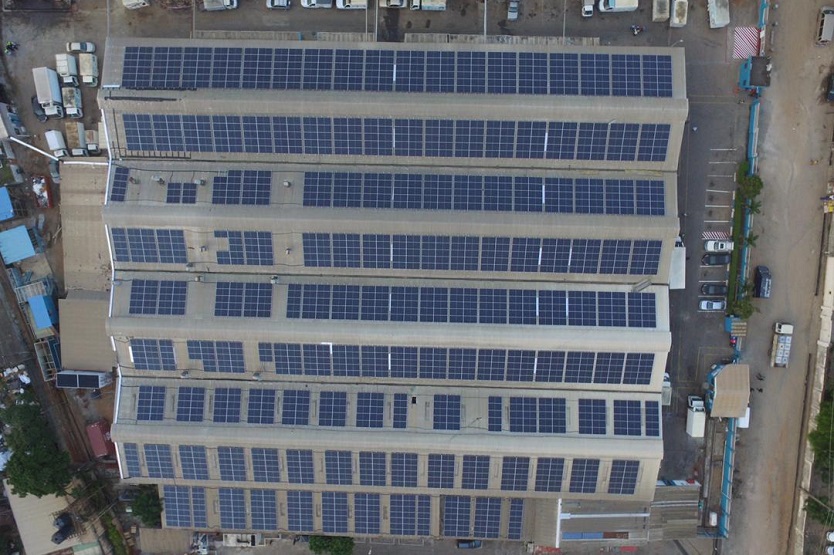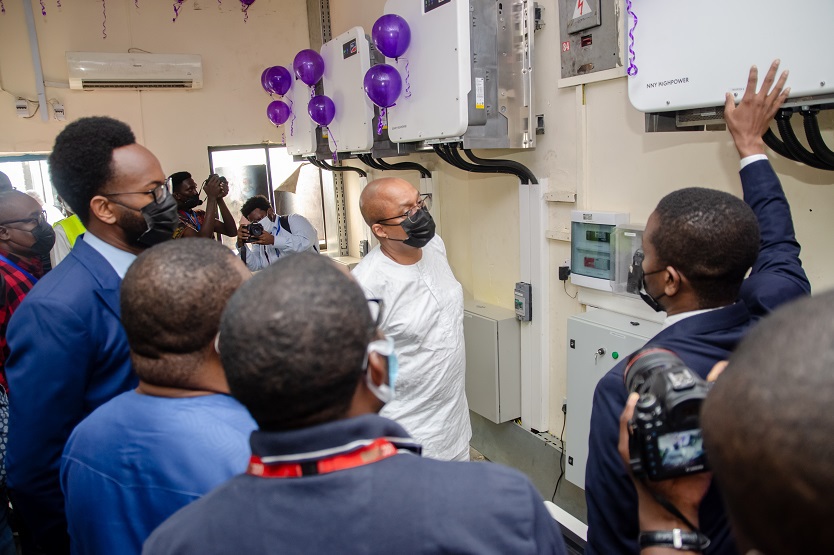
The 800 kWp Solar-Hybrid-System on the roof of UAC Diaries.
© GIZ / Truss Associates
A solar hybrid photovoltaic (PV) system with a capacity of 109kWp has been installed at Coldcare Limited in Lagos, Nigeria. Coldcare Limited is a cold storage facility for food produce servicing customers ranging from hotels, restaurants and (Fast Moving Consumer Goods) FMCG companies. These clients enter long-term lease agreements to keep their food in the Coldcare cold rooms, while Coldcare ensures that the chillers in the cold rooms are powered 24/7 throughout the year.
With the increase of grid electricity costs, and an expansion of the cold storage facility in year 2020, Coldcare saw a huge increase in their operating costs and was looking for ways to reduce it. Energy costs account for about 40% of their operating costs so an increase in this would naturally affect the profitability of the business.
The system provides the cold storage facility with renewable energy, saving up to 335 tonnes of CO2 emissions per year. The solar system will provide up to 40 % of the factory’s daytime power consumption on sunny days, reducing the use of diesel generators. With the new solar system, Coldcare is expected to save about 10 % on its current energy costs over a ten-year period with zero initial investment from Corldare.
The PV system consists of an array of solar modules mounted on the factory’s roof that convert energy from the sun into electricity, inverters that change this electricity from a DC current to AC current, and a monitoring system that continuously tracks the output of the system and also enables remote monitoring. The power produced is supplied to the factory’s existing electrical system (grid + diesel gensets), and interconnects via a hybrid controller. The controller enables the prioritization of the power sources based on the cheapest available source per kWh, with solar power in this case as the primary source. The factory is still connected to the national grid, however the electricity produced by the solar system is solely for captive/self-consumption and is not fed back into the grid. During the night or on cloudy days, when not enough energy is produced by solar power, electricity comes from either the national grid or diesel genset.
German contribution
The project was coordinated and implemented by Daystar Power Group, a German SME providing renewable energy solutions for commercial and industrial clients esp. in West Africa.
Using its Solar-as-a-Solution model under which the company pays a flat tariff per kilowatt hour with zero upfront costs, Daystar Power designed a tailored solar solution for Coldcare Limited. For the installation, Daystar mounted 204 units of 535Wp PV modules, on the roof of UAC Dairies Ikeja factory. The solar panels are connected to a remote monitoring system, allowing for preventive maintenance.
Daystar now operates and manages the power system, guaranteeing 99% system uptime and Coldcare only need to focus more on running their core business.
Support of the German Energy Solutions Initiative
The Project Development Program (PDP) team of the German Energy Solutions Initiative supported the project development process by advising on the technical and economic feasibility of the solar system on the site and played a key role in initiating business. PDP was involved in bringing together suitable partners for this project.
This was done by collecting data to understand Coldcare’s current energy costs, pattern of operation and energy sustainability goals. With these PDP was able to advise Coldcare on the cost savings opportunity the solar system could provide. Throughout the process, PDP addressed all technical, financial and legal questions. PDP outlined the potential of saving considerable costs by exploring different investment models that were well-suited to their financial demands.
With a corresponding mandate from Coldcare, they were connected to German SMEs that fit their criteria. B2B meetings to negotiate with experienced project developers were set up.
Nigeria offers large prospects for climate friendly energy solutions as they are very cost competitive for running commercial and industrial operations. PDP plays an important role in the energy transition in Nigeria by improving the technical know-how and advising on the access to finance in the region.

Daystar engineering team showing the UAC team how the system works during the inauguration event.
© UAC Foods Ltd.
Support of the German Energy Solutions Initiative
The Project Development Programme (PDP) team of the German Energy Solutions Initiative supported the project development process by providing technical and economic analyses and played a key role in initiating business. The PDP team was also involved in bringing together suitable partners for this project.
This was done by collecting data to understand UAC’s current energy costs, pattern of operation and energy sustainability goals. With these PDP was able to advise UAC on the cost savings opportunity the solar system could provide. Throughout the process, PDP addressed any technical, financial and legal questions. PDP outlined the potential of saving considerable costs by exploring different investment models that were well-suited to their financial demands. With a corresponding mandate by UAC was connected to German SMEs that fit their criteria. B2B meetings to negotiate with experienced project developers where set up.
Nigeria offers large prospects for climate friendly energy solutions as they are very cost competitive for running commercial and industrial operations. PDP plays an important role in the energy transition in Nigeria by improving the technical know-how and advising on the access to finance in the region.
System Data
| Installed capacity: | 800 kWp |
| Location: | Lagos, Nigeria |
| Client: | UAC Dairies |
| In operation since | August 2021 |
| German business partner: | Daystar Power Group |
| Type: | Roof-top PV |
| Yield: | Up to 1,251 kWh per year |
| Saved CO2 emissions: | Up to 2000 tonnes per year |
| Number of solar panels: | 1,496 of 535 Wp PV Modules |
| Number of inverters: | 8 |


